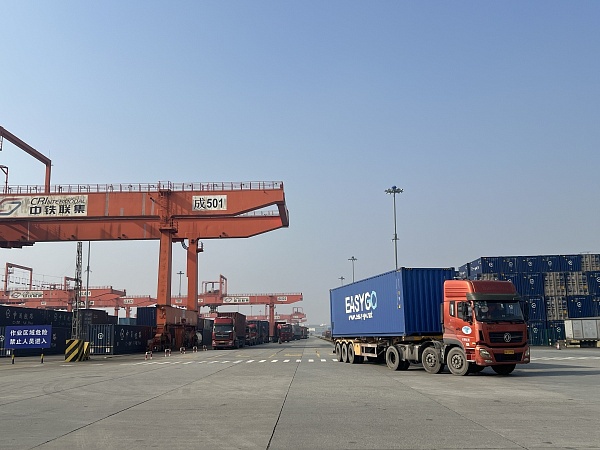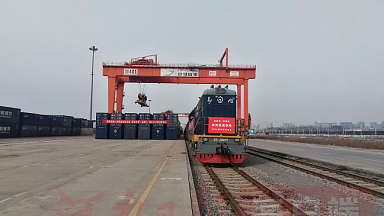They are linked by the China-Europe Express (Chengdu-Chongqing), a key open hub connecting Sichuan and Chongqing to the world.
On the morning of December 26, a Bridging News reporter saw trucks moving at the Chengdu International Railway Port, with containers stacked like hills. Among China’s over 100 cities with China-Europe freight trains, Chengdu and Chongqing rank in the top three for competitiveness.
From January to November, the China-Europe Railway Express (Chengdu—Chongqing) operated more than 5,500 trains, totaling more than 21,000. It led China with over 30% of the national total. Its «hub-and-spoke + direct trunk line + multimodal transport» model covers Europe.
Ning Wei, Marketing Director of Chengdu International Rail Port Investment and Development Co., Ltd., said that since the China-Europe Express (Chengdu-Chongqing) brand was established, Chengdu International Railway Port has strengthened its cooperation with Chongqing, offering differentiated services in scale and pricing.
Since last year, they’ve collaborated on sourcing goods and shared overseas warehouse services in Hamburg and Budapest, reducing logistics costs by about 30% while providing customers with more quality logistics options.
Previously, exports mainly included wine, milk powder, and food products. Now, they also feature high-value items like electronic components.
Ning added that to boost their open trade, they will collaborate on sourcing goods abroad, expanding resources, and enhancing the value of the China-Europe trains moving forward.
«Our cooperation with Chongqing on the New International Land-Sea Trade Corridor has expanded as well,» said Ning. «Particularly in exporting products from local industries like automobiles and spare parts.»
Launch over 1,000 hydrogen vehicles and 20 stations
As global focus on clean energy rises, hydrogen’s efficiency and sustainability drive its use across industries. Chengdu and Chongqing are combining strengths to develop the Chengdu-Chongqing Hydrogen Corridor.
Cao Zhihui, Deputy Director of the Hydrogen Energy Industry and Market Development Department at Dongfang Boiler Co. Ltd. (DEC Boiler) said the Chengdu-Chongqing Hydrogen Corridor is driving green innovation by connecting the two cities, enabling seamless hydrogen vehicle travel and fostering cross-regional industry collaboration. Over 1,000 hydrogen fuel cell vehicles and nearly 20 hydrogen stations have been launched so far.
«Chengdu and Chongqing have rolled out hydrogen industry plans and support policies, forming a complete hydrogen supply chain with over 200 companies and research institutions in production, storage, transport, and usage,» said Cao.
Chengdu and Chongqing have developed a comprehensive hydrogen supply chain. DEC Boiler is leading pioneering research, such as MW-scale solar-to-hydrogen technology and fuel cell power systems, advancing domestic hydrogen technology.
The two cities have also planned multiple intercity routes and direct trunk lines, connecting key urban clusters and industrial hubs along the Chengdu-Chongqing main line, forming an integrated hydrogen economy network.
Cao said the demonstration projects will strengthen the industry chain, enhancing market prospects and economics while driving the development of logistics and the hydrogen industry in both cities.




